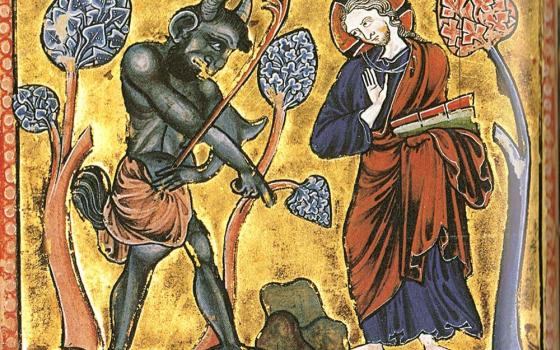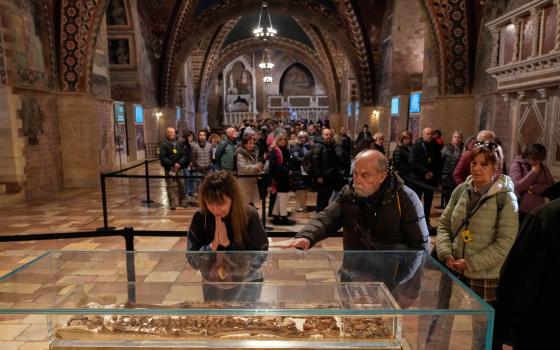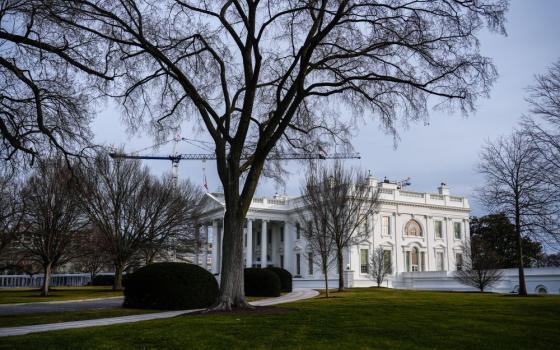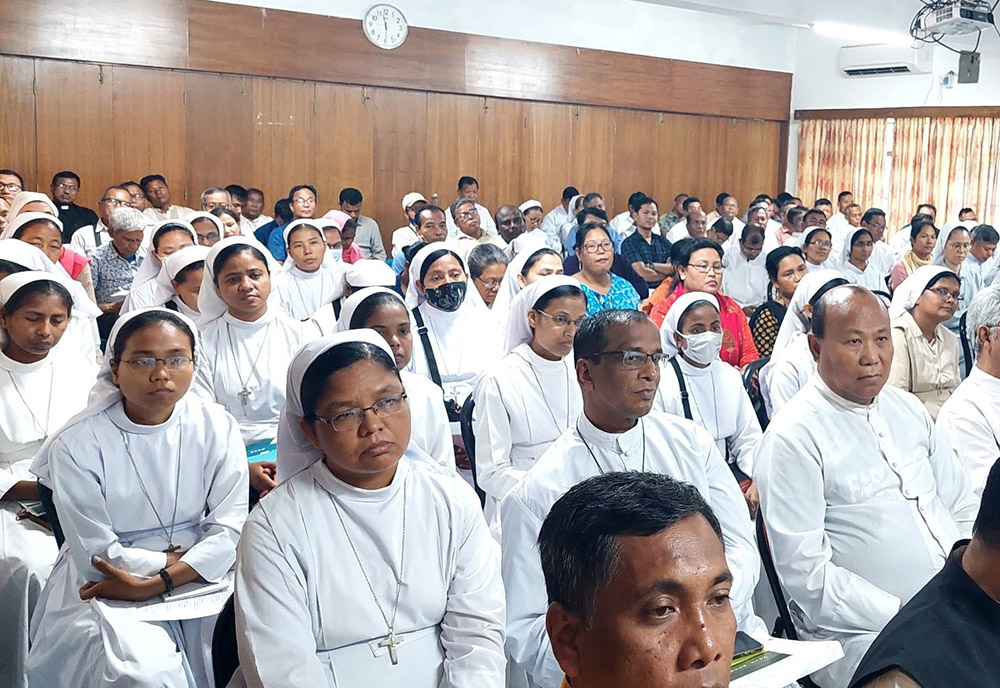
Participants listen during an interreligious dialogue workshop held at Caritas Mymensingh Regional Office in Mymensingh, Bangladesh, on May 20. (Courtesy of Nirmol Rozario)
Some 50 nuns attended a daylong interreligious dialogue workshop at Caritas Mymensingh Regional Office in Mymensingh, Bangladesh, May 20. The workshop's theme was the skill development of priests, pastors and other religious leaders.
"We participated in a workshop where we learned about interreligious harmony. We live in a country where people of different faiths live. This training helped us to understand the importance of harmony and we could boost it at our workplace," Sr. Mary Jacinta, a member of Salesian Sisters of Mary Immaculate, told Global Sisters Report.
The workshop was organized by government-run Christian Religion Welfare Trust, with guests Faridul Haque Khan, state minister of religious affairs; Bishop Ponen Paul Kubi of Mymensingh; and Jewel Areng, a Christian member of Parliament. The program was presided over by Nirmol Rozario, secretary and trustee of Christian Religion Welfare Trust.
Along with the sisters, a total of 170 Catholic and Protestant pastors and Muslims also participated in the workshop.
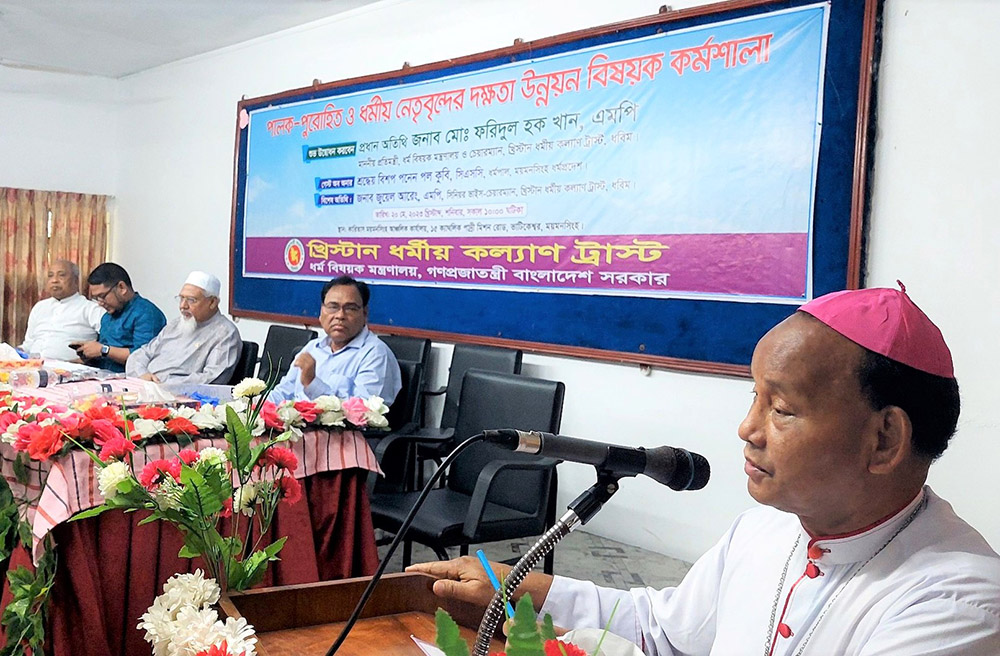
Bishop Ponen Paul Kubi, right, addresses the interreligious dialogue workshop held at Caritas Mymensingh Regional Office in Mymensingh, Bangladesh, May 20. (Courtesy of Nirmol Rozario)
Fr. Ashesh Dio taught the "role and responsibility of pastors and religious leaders to establish interreligious and coexistence."
Brother Erik of the Taizé community taught the "role and responsibility of pastors and religious leaders to take care of the faithful's spirituality."
Jacinta, who is the provincial superior of the Salesian Sisters, explained that this workshop would boost interreligious harmony in this pluralist society: "We nuns work in schools and at the dispensary where 95% of our beneficiaries are non-Christians. This workshop will help us to take care of our interreligious relationship and boost it with other faith people."
She said she was happy to see such a good number of people from different denominations at the workshop. "The Bangladesh government gave Catholics, Protestants and Muslims an opportunity to sit together to discuss in harmony. We talk, listen and eat together. We had a very good time. This is how we show respect, and love each other in the workshop."
Twenty-two Salesian Sisters participated in the workshop.
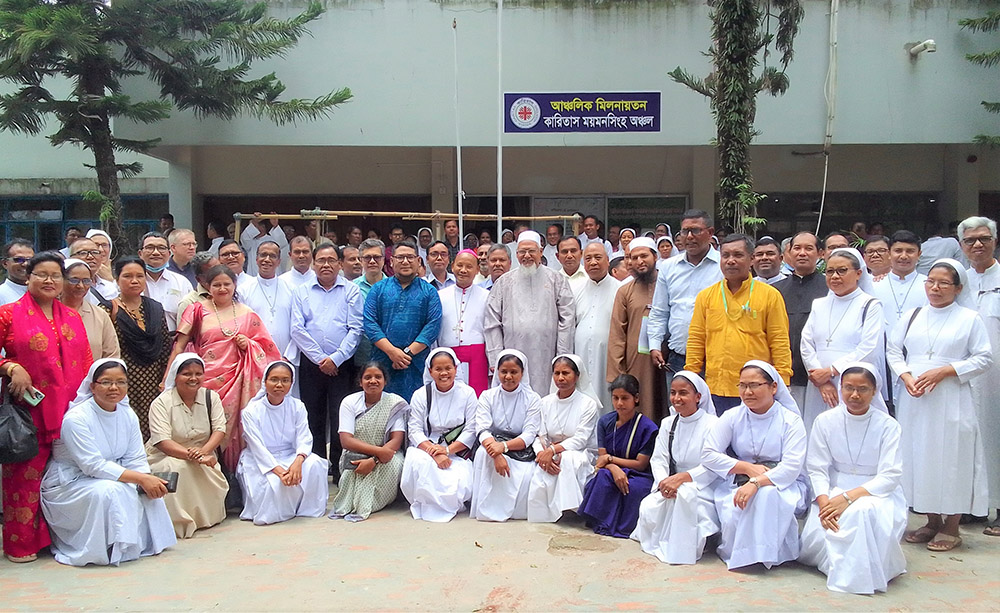
The participants in the interreligious dialogue workshop pose for a photo in Mymensingh, Bangladesh, on May 20 (Courtesy of Nirmol Rozario)
Sr. Roni Gomes, a member of the Missionary Sisters of the Immaculate, told Global Sisters Report that from this workshop, she learned how to attract children to church. "Nowadays, children are not interested in church activity. If we discover what children like, and if we design our church activity with them, children willingly will come," she said.
Gomes said three sisters from her congregation participated in the workshop. "We learned we should respect other religious faiths," she said. "As a teacher in a school, I also will teach my students about harmony and coexistence so that religious hate and violence don't happen by our students."
On July 1, 2016, five armed Islamist militants stormed the Holy Artisan Bakery in the diplomatic area of Dhaka, holding diners hostage before killing 20 people: three Bangladeshis, seven Japanese, nine Italians, and one Indian. Between 2004 to 2016, many bloggers, writers, atheists and other non-Muslims were attacked and killed by militants.
Advertisement
The Bangladesh government is strongly working against militancy. Through workshops, the government encourages different faith leaders to work for religious harmony as they can reach the wider community easily.
The same workshop has been organized for Muslim, Hindu and Buddhist religious leaders over the years.
"The aim of the workshop was to build religious harmony among different faith people," Rozario told GSR.
"We chose priests and nuns because they are a key player in building and teaching interreligious harmony as they work in schools and dispensaries, and 95% of those that receive their services are non-Christians," Rozario added. He said that similar workshops had been conducted in Khulna, Dhaka, Rajshahi and Sylhet and gradually workshops will be held in other regions.
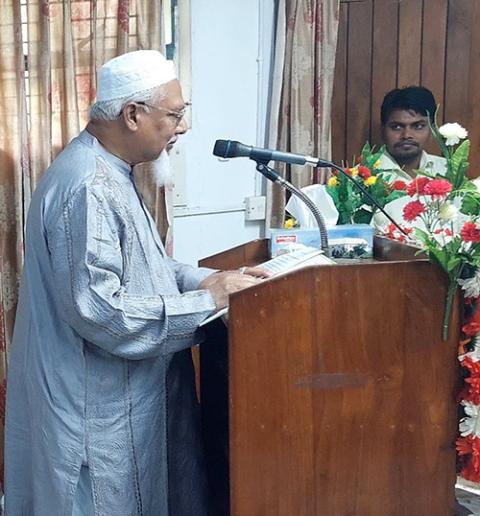
Faridul Haque Khan, Bangladesh state minister of religious affairs, speaks to the interreligious dialogue workshop at Caritas Mymensingh Regional Office May 20. (Courtesy of Nirmol Rozario)
"Bangladesh is a non-communal country," Khan told participants. "We have acquired this non-communal consciousness especially through the great war of liberation. We participated in the liberation war of 1971 under the leadership of the greatest Bengali father of the nation, Bangabandhu Sheikh Mujibur Rahman, irrespective of caste, religion and caste. Fifty-two years have passed since the great independence. Today, Bangladesh has taken its place as a 'role model' of development."
"But the sad thing is that a self-interested section of the country is not happy to see this development and progress," the state minister also said. "They want to create obstacles in the progress of development. They want to use religion as a political tool. They want to incite communalism against the non-communal spirit. … I have been called to build a harmonious society. I am still making this call to everyone."
To confront the terrorism and extremism, the Ministry of Religious Affairs began a Religious Harmony and Awareness Raising project, which includes the interreligious workshops.
Kubi thanked the organizers for conducting the workshop.
"We Christians in Bangladesh are tiny, but after the liberation war in 1971, we are contributing to the country's development by education, health and social development," Kubi said. "We also work to boost interreligious harmony. And in the future it will continue."



